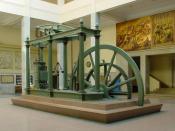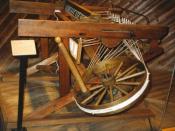Obstacles to Industrialization
1. lack of labour-95% of people worked on farms
2. lack of food supply- farmers only made enough food for themselves
3. fallow field system-1 of 3 fields would lie fallow for a year
4. poor transport- between cities and possible industrial areas
5. many countries had no common currency and no unified law code
6. Aristocracy- were pro farms and usually anti-industrialization
7. Guilds- constricted the economy and practiced Mercantilism
-England started the Industrial Revolution bc:
-they already had a common currency and unified law code and an aristocracy historically controlled by the King who was influenced strongly by the English Parliament
-2 kinds of Aristocracy in England: 1.peerage-primogenture made it that only the eldest son got the fathers title and joined the peerage so 2. gentry-which was made up of younger noble sons and rich merchants were pro industr. and helped make England #1
-they had a domestic system that hurt guilds because in it ppl.
made products at home out of the guilds control and then the Coporation Act of 1835 outlawed guilds in England
-Enclosure Movement tried to organize and consolidate little fields farmed by peasants into big fields run by yeomen-name for a successful farmer
-Jethro Tull invented the seed drill which planted seeds in rows and not randomly and also invented the horse drawn plow
-Charles Townshead invented the theory of crop rotation in farming
Beginnings of the Industrial Revolution:
-textile was the major product made in England and cotton had to be 1. spun 2. woven
-John Kay invented the flying shuttle in 1733 which made weaving go much quicker
-Charles Hargreaves invented the Spinning Jenny in 1760 which spun cotton 6x as fast
-Richard Arkright invented the water frame which used water as a power source to spin...


